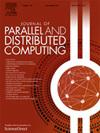Price-aware resource management for multi-modal DNN inference in collaborative heterogeneous edge environments
IF 3.4
3区 计算机科学
Q1 COMPUTER SCIENCE, THEORY & METHODS
引用次数: 0
Abstract
To address the limitations of ARM64-based AI edge devices, which are energy-efficient but computationally constrained, as well as general-purpose edge servers, this paper proposes a multi-modal CollaborativeHeterogeneous Edge Computing (CHEC) architecture that achieves low latency and enhances computational capabilities. The CHEC framework, which is segmented into an edge private cloud and an edge public cloud, endeavors to optimize the profits of Edge Service Providers (ESPs) through dynamic heterogeneous resource management. In particular, it is achieved by formulating the challenge as a multi-stage Mixed-Integer Nonlinear Programming (MINLP) problem. We introduce a resource collaboration system based on resource leasing incorporating three Economic Payment Models (EPMs), ensuring efficient and profitable resource utilization. To tackle this complex issue, we develop a three-layer Hybrid Deep Reinforcement Learning (HDRL) algorithm with EPMs, HDRL-EPMs, for efficient management of dynamic and heterogeneous resources. Extensive simulations confirm the algorithm's ability to ensure convergence and approximate optimal solutions, significantly outperforming existing methods. Testbed experiments demonstrate that the CHEC architecture reduces latency by up to 21.83% in real-world applications, markedly surpassing previous approaches.
协同异构边缘环境下多模态DNN推理的价格感知资源管理
为了解决基于arm64的人工智能边缘设备节能但计算受限以及通用边缘服务器的局限性,本文提出了一种多模态协同异构边缘计算(CHEC)架构,以实现低延迟和增强计算能力。CHEC框架分为边缘私有云和边缘公共云,通过动态异构资源管理,优化边缘服务提供商(esp)的利润。特别地,它是通过将挑战表述为多阶段混合整数非线性规划(MINLP)问题来实现的。我们引入了一个基于资源租赁的资源协作系统,该系统结合了三种经济支付模式(epm),确保了资源的高效和盈利利用。为了解决这个复杂的问题,我们开发了一种带有epm的三层混合深度强化学习(HDRL)算法,HDRL- epm,用于有效管理动态和异构资源。大量的仿真证实了该算法确保收敛和近似最优解的能力,显著优于现有方法。测试平台实验表明,CHEC架构在实际应用中减少了高达21.83%的延迟,明显优于以前的方法。
本文章由计算机程序翻译,如有差异,请以英文原文为准。
求助全文
约1分钟内获得全文
求助全文
来源期刊

Journal of Parallel and Distributed Computing
工程技术-计算机:理论方法
CiteScore
10.30
自引率
2.60%
发文量
172
审稿时长
12 months
期刊介绍:
This international journal is directed to researchers, engineers, educators, managers, programmers, and users of computers who have particular interests in parallel processing and/or distributed computing.
The Journal of Parallel and Distributed Computing publishes original research papers and timely review articles on the theory, design, evaluation, and use of parallel and/or distributed computing systems. The journal also features special issues on these topics; again covering the full range from the design to the use of our targeted systems.
 求助内容:
求助内容: 应助结果提醒方式:
应助结果提醒方式:


